Watermelons are a nice treat for summers. It’s a good source of various vitamins and minerals. With that said, this article will answer the question: Can rabbits eat watermelon?
Can Rabbits Eat Watermelon?
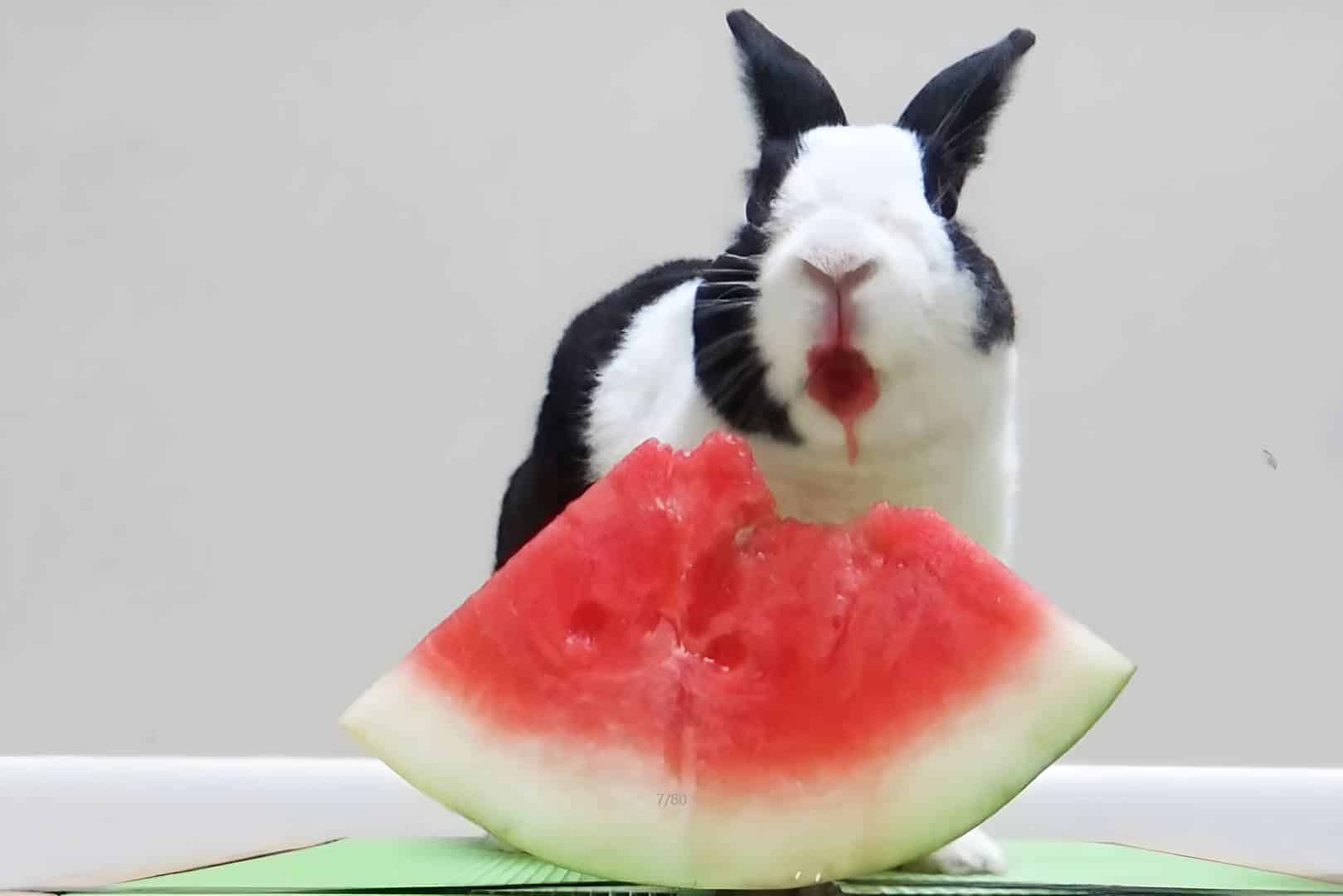
The answer is YES, rabbits can eat watermelon, but it shouldn’t be a part of their primary food source. Watermelons can provide a good vitamin A and C source when fed in moderation. Rabbits can feed on the rind and fruit of the watermelon.
Can Baby Rabbits (Kits) Eat Watermelon?
Kits can’t eat watermelon. When the rabbit is under a year old, they still have a susceptible and easily irritated digestive system. Feeding watermelon to kits might cause diarrhea and irritation.
Can Wild Rabbits Eat Watermelon?
Although it’s not their first option, wild rabbits can and will eat watermelon. Since rabbits are grazing animals, their digestive tract and metabolism primarily digest grass and hay.
Although wild rabbits are observed to eat berries and other fruits in the wild, albeit sparingly, it’s more of a survival strategy when the food is scarce rather than a regular part of their diet.
Wild rabbits also chew on the leaves of watermelon when it’s available.
What Parts of Watermelon Can a Rabbit Eat?
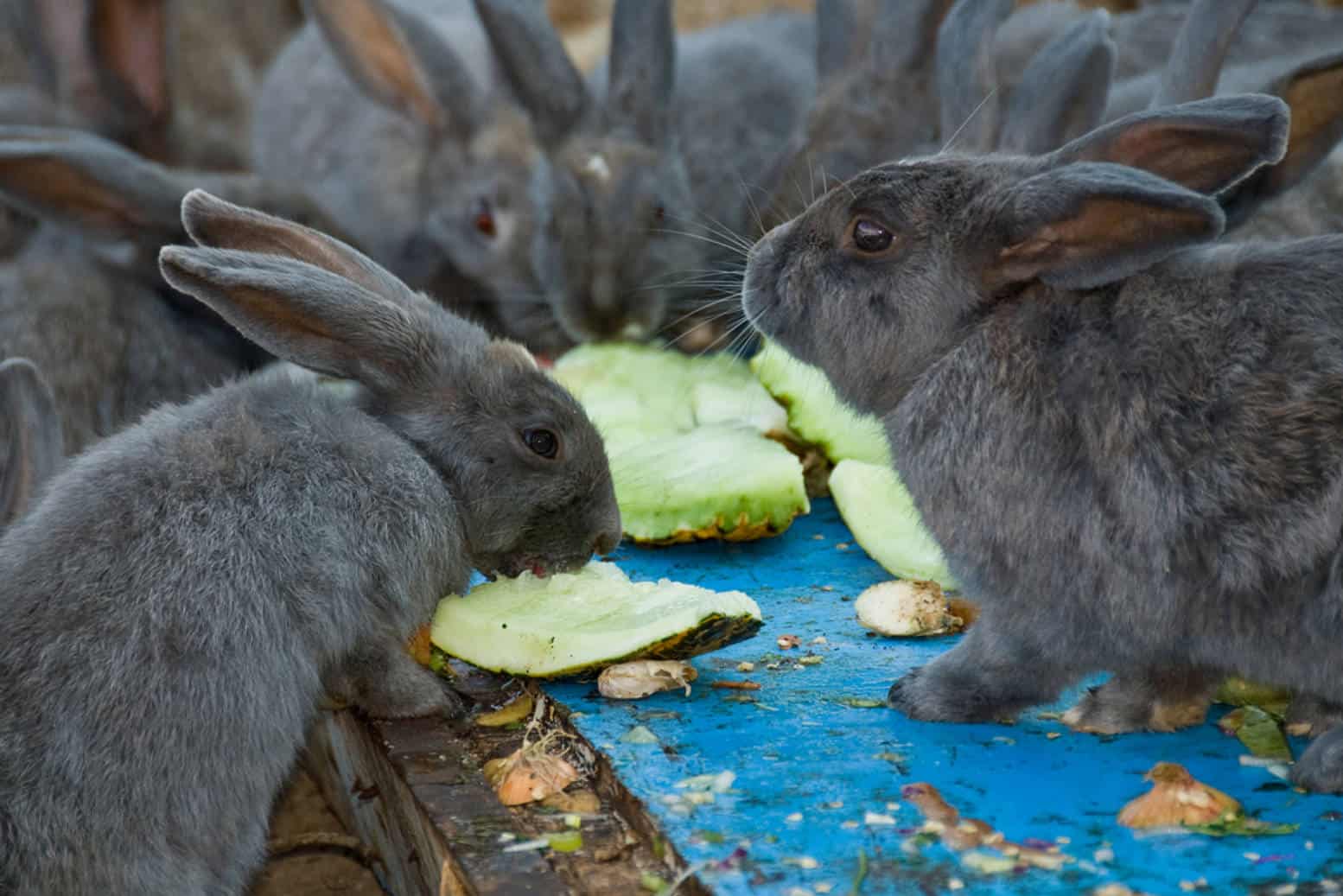
Rabbits can eat every part of watermelons other than the seed. The seed of watermelons is not poisonous, but the digestive system of rabbits can’t process the seeds. The undigested watermelon seeds can cause gastrointestinal blockage.
The rind, fruit, and leaves are pretty much safe for rabbits to eat. Rabbits can eat the watermelon leaves in higher amounts compared to the fruits.
It does not contain a high amount of sugar. Watermelon leaves can also be mixed with hays and grass.
The rind of the watermelon is healthy for rabbits to eat. It has a lower sugar count and much higher fiber than the fruit.
Nutritional Value of Watermelon
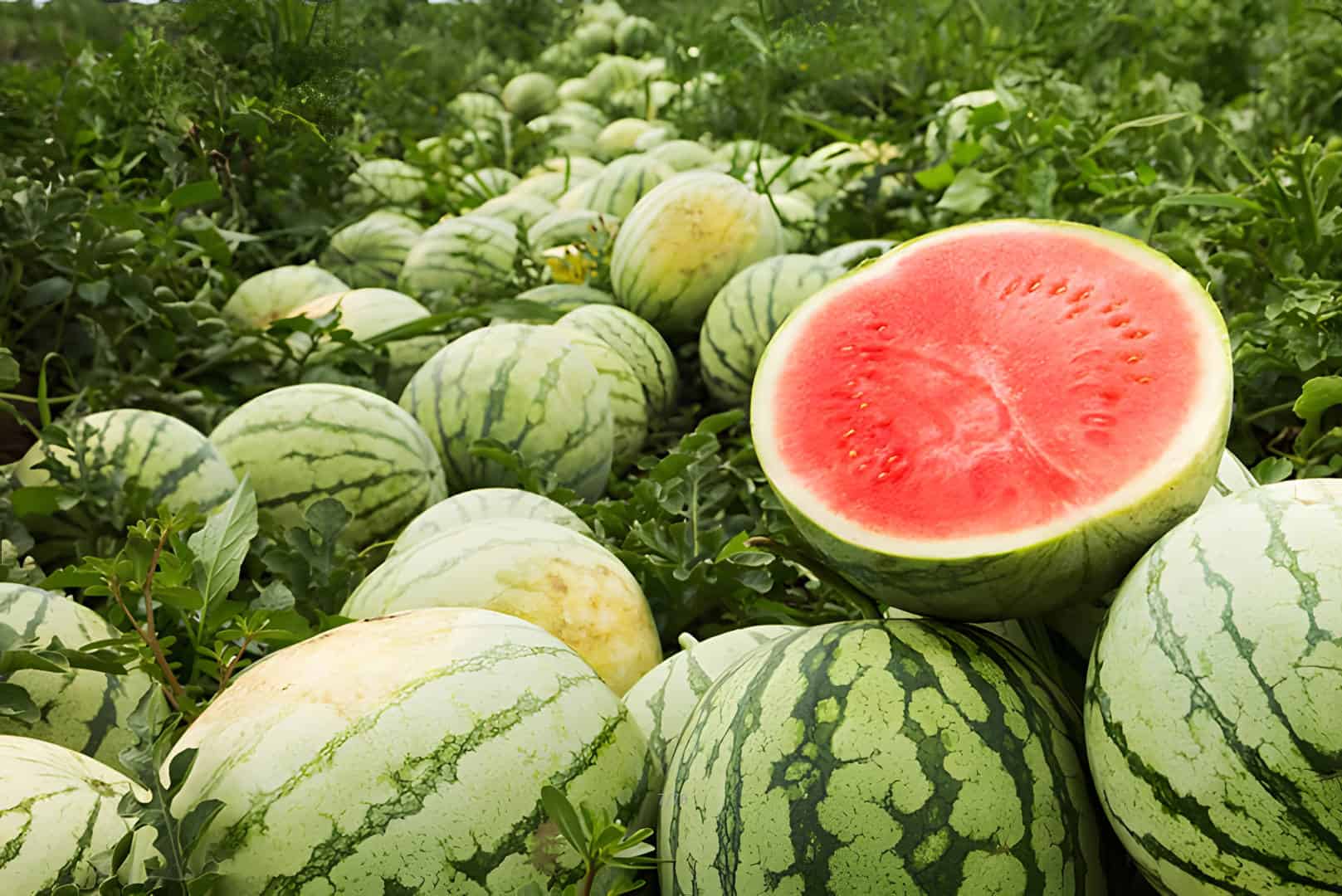
- Water: 91%
- Carbohydrates: 11.5g
- Calories: 30%
- Fiber: 0.4g
- Protein: 0.9g
- Sugar: 6.2g
- Vitamin A: 42.6mcg
- Vitamin C: 12.3mg
- Lycopene: 6890mcg
- Fat: 0.2g
Information provided by USDA for approximately one hundred grams or 2/3 cup watermelon serving.
Water Content
High water content can be great for rabbits. It can provide them with a good source of hydration during the hot summertime. You can feed the watermelon as a snack to combat the hot and humid climate.
Carbohydrates
Carbohydrates are the cornerstone in making energy. Watermelon has a good amount of carbohydrates, perfect to energize your pet. The mineral also fuels the organs to function correctly.
Vitamin A
Vitamin A is suitable for your rabbit’s eyesight and general growth. Watermelon has a higher vitamin A than other fruits and vegetables such as carrots.
Vitamin C
Vitamin C deals with the immune system. The vitamin strengthens the body’s natural defenses against virus and bacterial infection. As rabbits get easily sick, they must have a sufficient supply of vitamin C. If your rabbit has a wound or disease, having enough Vitamin C will help them tremendously in their recovery.
Fiber
Fiber is an essential part of any rabbit’s diet as they have sensitive metabolism and digestive tract—the mineral aid in the digestion of food they intake. Grass and hay are very high in fiber. That’s why it’s the primary food source for rabbits. You can find a good amount of fiber in watermelons.
Lycopene
Lycopene is commonly present on naturally red fruits and vegetables such as tomatoes and watermelons. It’s a carotenoid that causes the bright red pigments present on fruits and vegetables. The chemical is related to beta-carotene and helps fight off heart disease.
Other Vitamins
Watermelons also have small amounts of vitamin B, potassium, magnesium, and copper. They are present, but you can also find them in higher doses with other fruits and vegetables.
Watermelon Feeding Tips
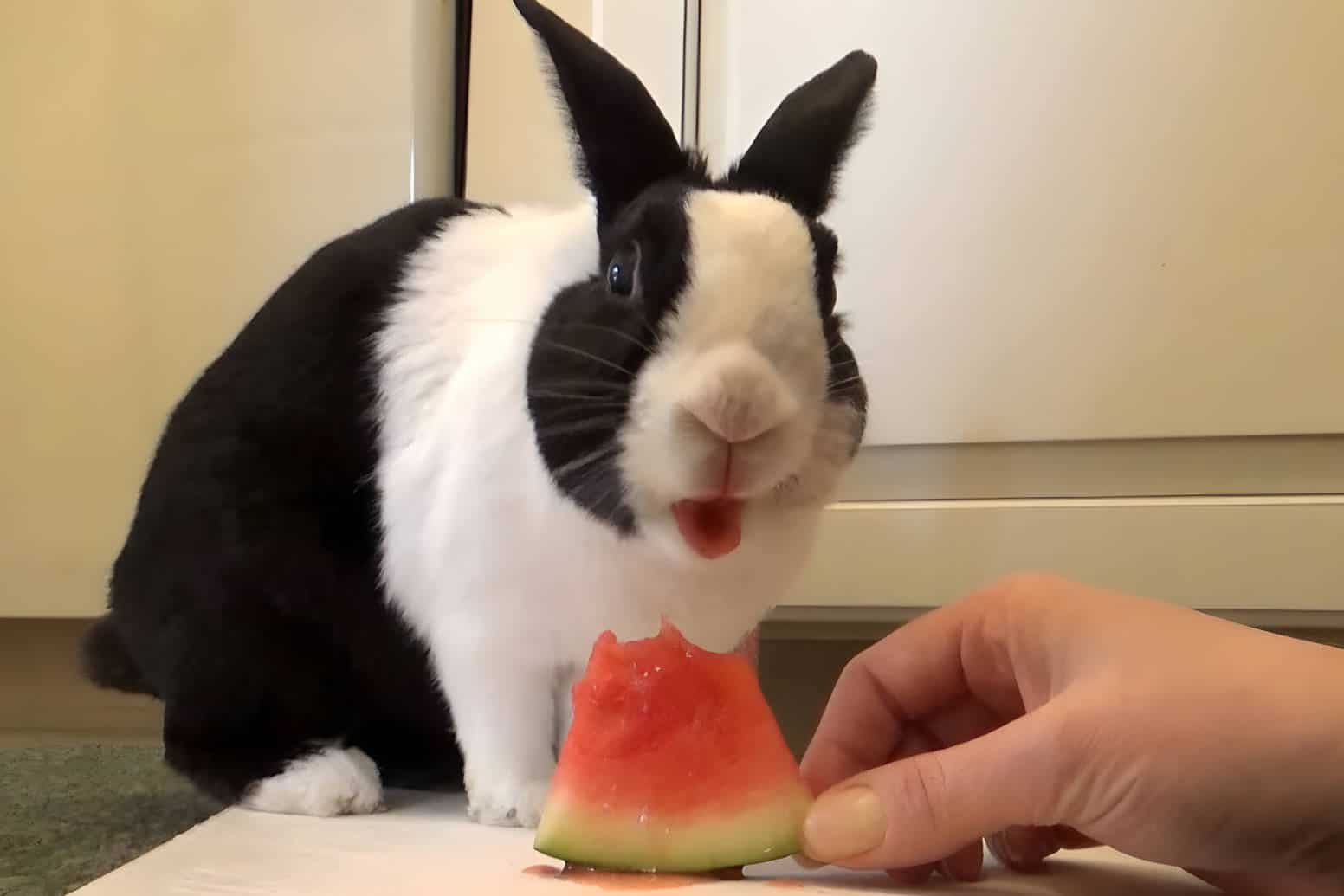
A healthy watermelon portion for rabbits is one to two tablespoons or 15 to 30 grams per serving. It would be best to give rabbits a serving of watermelon and other fruits only once every one to two weeks.
Fruits have very high sugar content, so feeding them to your rabbit can put them at risk of various health conditions such as heart failure and higher calorie intake.
Like any other new food, you should introduce and feed watermelons slowly. A small one-inch cube per day is good enough for bigger servings. Smaller servings over time will train the metabolism of
Serving them in cube form and not slices will also limit the development of fur balls. The sticky water content from watermelons can make the grooming of your rabbits harder. It can result in fur clumping, which can be a problem.
Watermelons are an incredible summer snack not just for humans but also for rabbits. Since it’s 90% water, it can be an excellent way to keep your rabbits hydrated and cooled during the humid and hot summertime.
It’s essential to know how to feed your rabbits as introducing food to them haphazardly properly might cause diarrhea and another slew of problems. It would help if you did not provide the rabbits more than the recommended serving amount as it can lead to various health risks.
When it comes to watermelon leaves, you can feed higher amounts than the fruit. The leaves do not have high sugar content, so it’s completely fine to provide it regularly.
Take note that you should approach the feeding of the watermelon leaves the same as watermelon fruit.
Slowly introduce the watermelon leaves ad to watch out for adverse reactions. If there are none, you can mix the watermelon leaves with the hay and grass that your rabbits eat.
The rind can also be eaten but not as much as the fruit. Although it has less sugar, it can still cause health risks when given in big servings.
To lessen the health risk, have every food other than grass and hay as a treat and not a food source.
Benefits and Cons of Watermelon on Rabbits
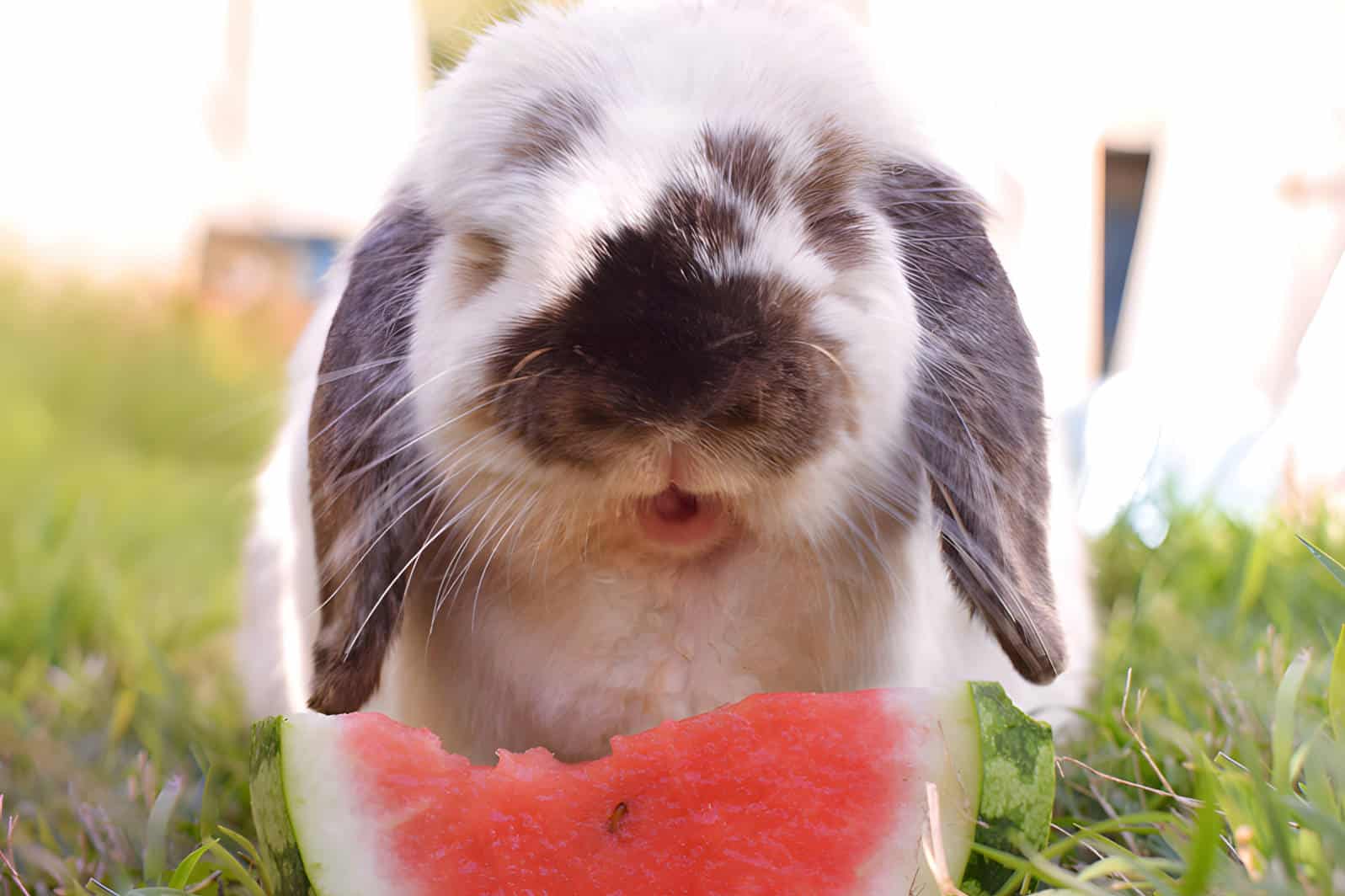
Watermelon can come with many benefits. With that said, it can come with downsides as well. The best way to get the most out of your rabbit’s diet is to feed everything in moderation.
Benefits | Cons |
● Rich in Vitamins and Minerals ● High-Water Content ● High in Carbohydrates ● Low on Calories | ● High in Sugar ● Can Cause Health Risks |
Benefits of Watermelon on Rabbits
Watermelon can have plenty of benefits for your rabbits. As stated above, it contains many vitamins and minerals vital for your rabbits’ health, such as vitamin C and A. it helps your pet’s overall health if you know how to feed it to them appropriately.
Watermelons have a good amount of water. In fact, 90% of the fruit is made with water. It’s great for hydrating your rabbits, especially in the summertime.
The fruit is high in carbohydrates, perfect for aiding the rabbit’s energy production. It helps fuel various organs such as the heart, brain, and kidney.
Fiber is another type of carbohydrate that is present in watermelons. It’s an excellent mineral that aids in the digestion of food. The mineral is essential for rabbits as they have a very sensitive metabolism and digestive tract.
The low fat and calories present in watermelons are also beneficial as it has a lower chance of giving your rabbit health risks such as heart disease.
Cons of Watermelon on Rabbits
Excessive watermelon can cause your rabbits a slew of health issues when not appropriately fed. Fruits have a high sugar content that may cause heart disease when eaten in high amounts. High amounts of sugar are not suitable for rabbits, as with other animals.
Giving them a serving of watermelon higher than the recommended amount can cause them to develop obesity and weight gain. Various liver diseases can also affect rabbits when they intake high sugar numbers, such as cirrhosis and fatty liver.
Fortunately, the dangerous effects can be entirely avoided easily by serving watermelons as a treat once every one to two weeks.
Other Fruits You Can Feed Your Rabbits
There are many fruits you can safely feed to your rabbits. Keep in mind that they should be served in small amounts on a few occasions. Most fruit has a high sugar content, so it should be eaten sparingly.
Banana
Bananas are rich in potassium and a lot of vitamins and minerals. The banana peel is even safe for rabbits to eat.
Apples
Apples are packed with various minerals and vitamins such as protein and fiber. Compared to other fruit, apples are less disruptive due to their fiber content. Don’t feed the core and seeds as the seed contain cyanide.
Berries
Various kinds of berries are safe for rabbit consumption. In fact, it’s observed that rabbits eat multiple types of berries in the wild.
In Conclusion
Rabbits can safely eat watermelon in moderation. It can offer a good number of benefits but also risky side-effects when not fed properly. The key is balancing giving treats such as watermelon and providing the common grass and hay.